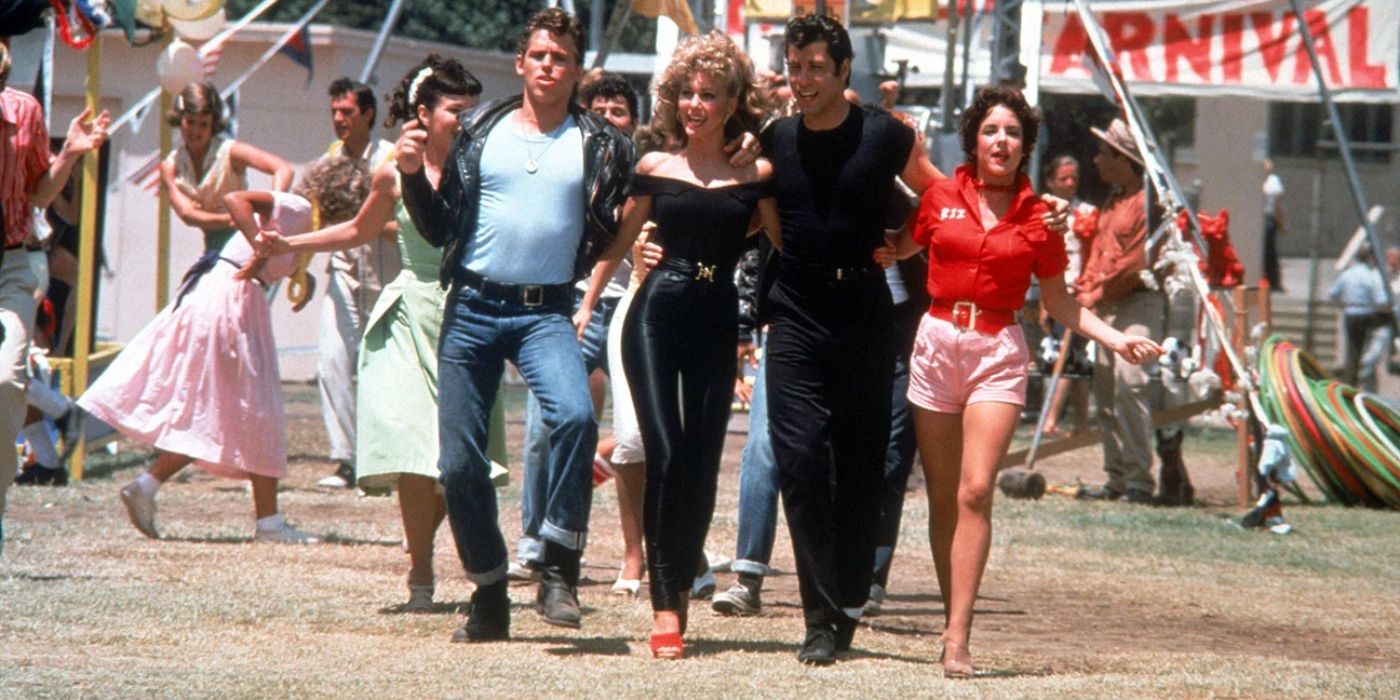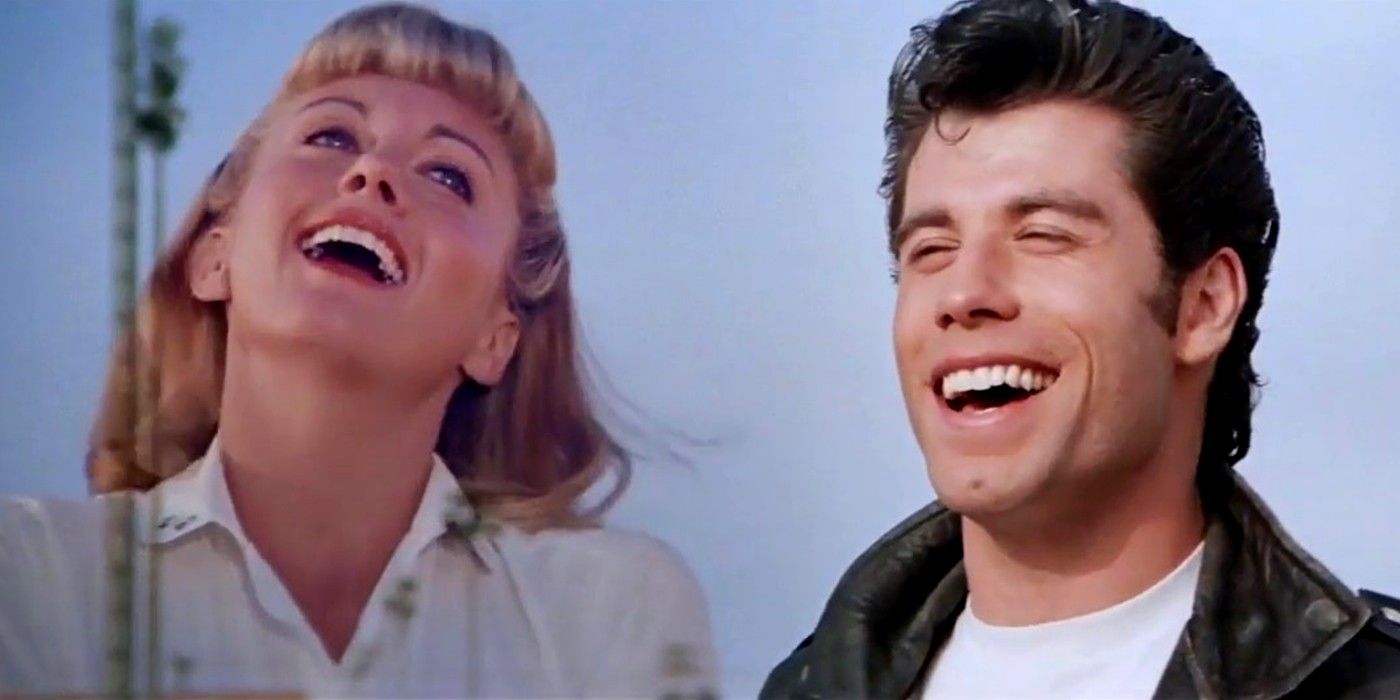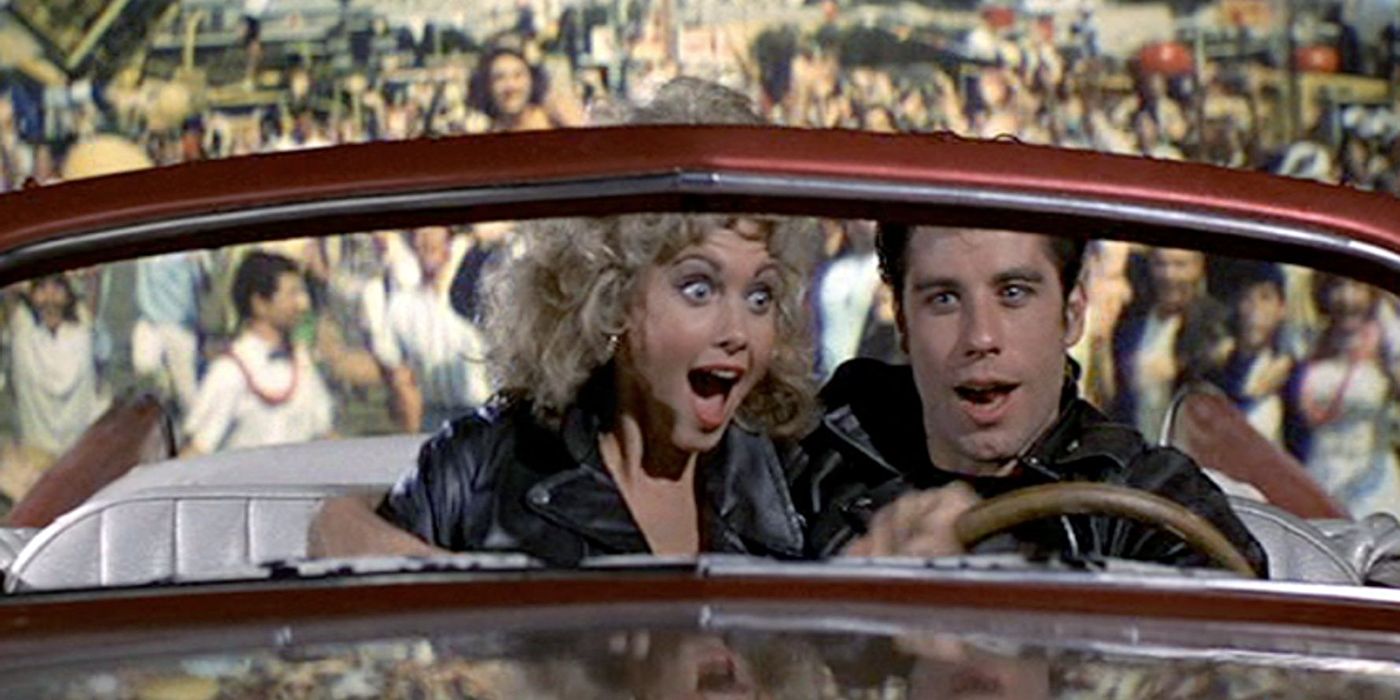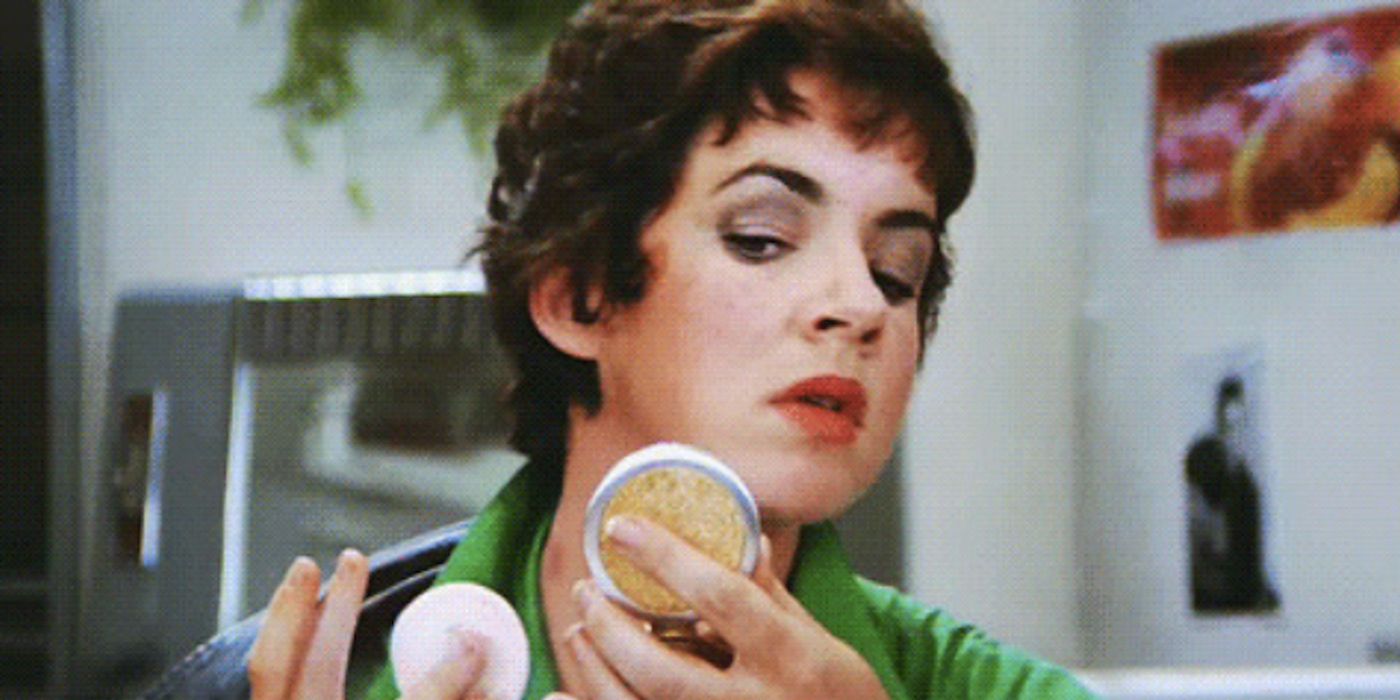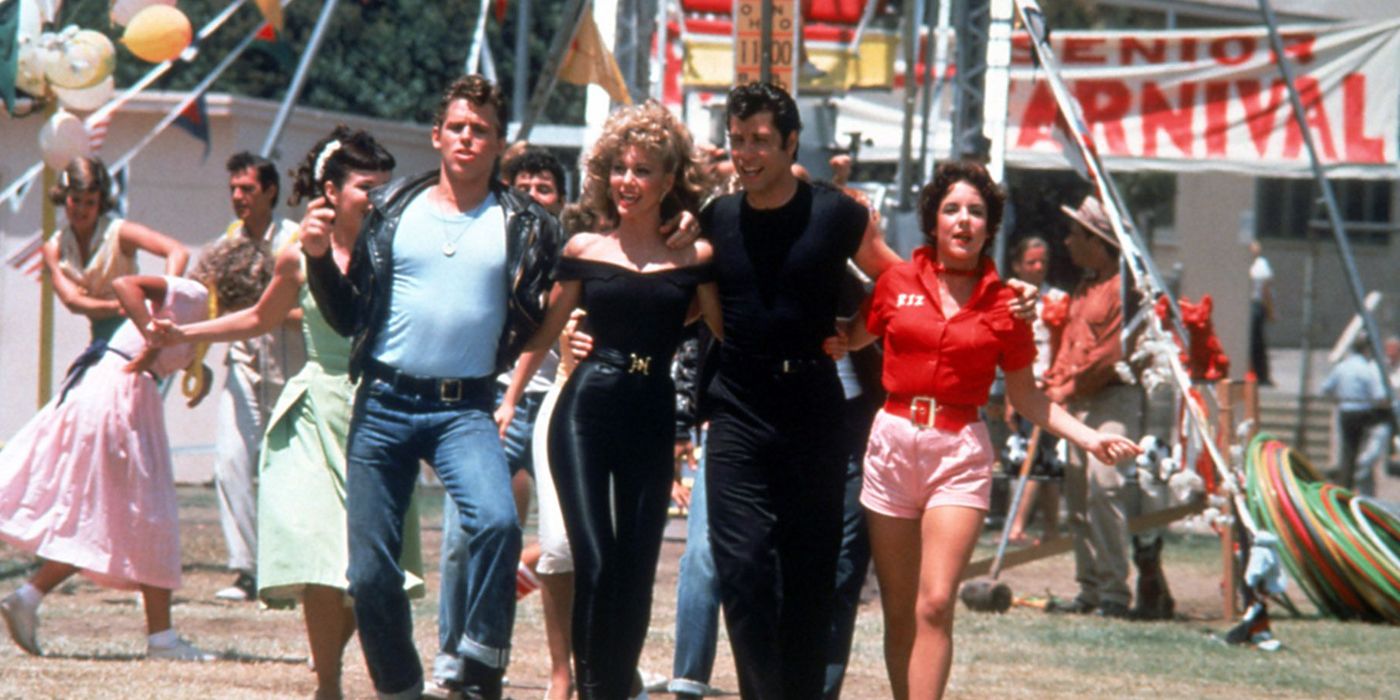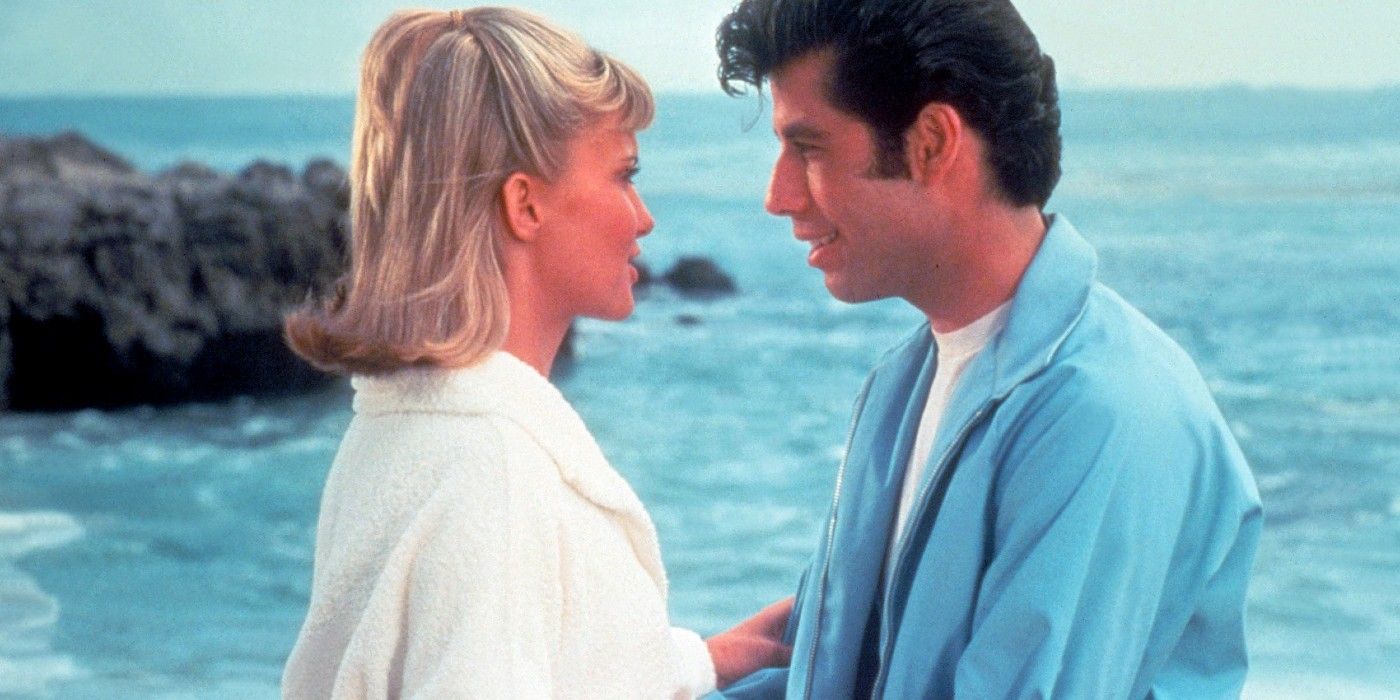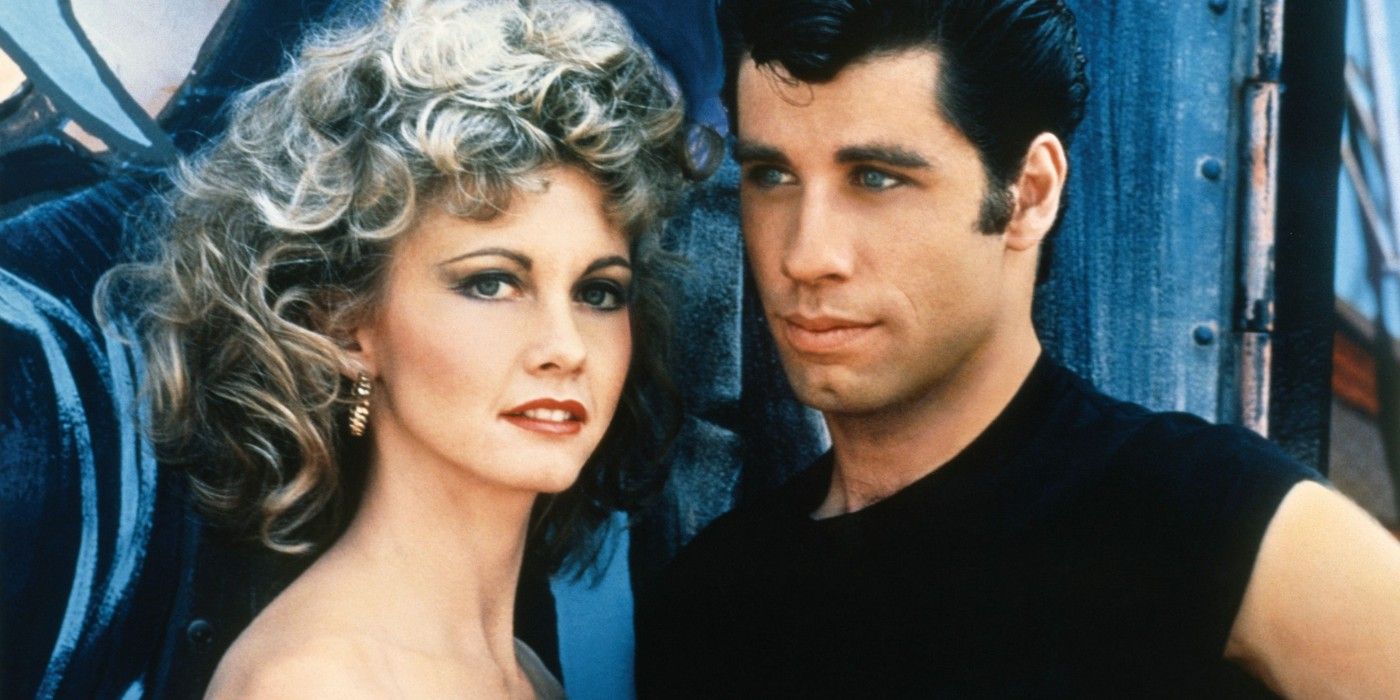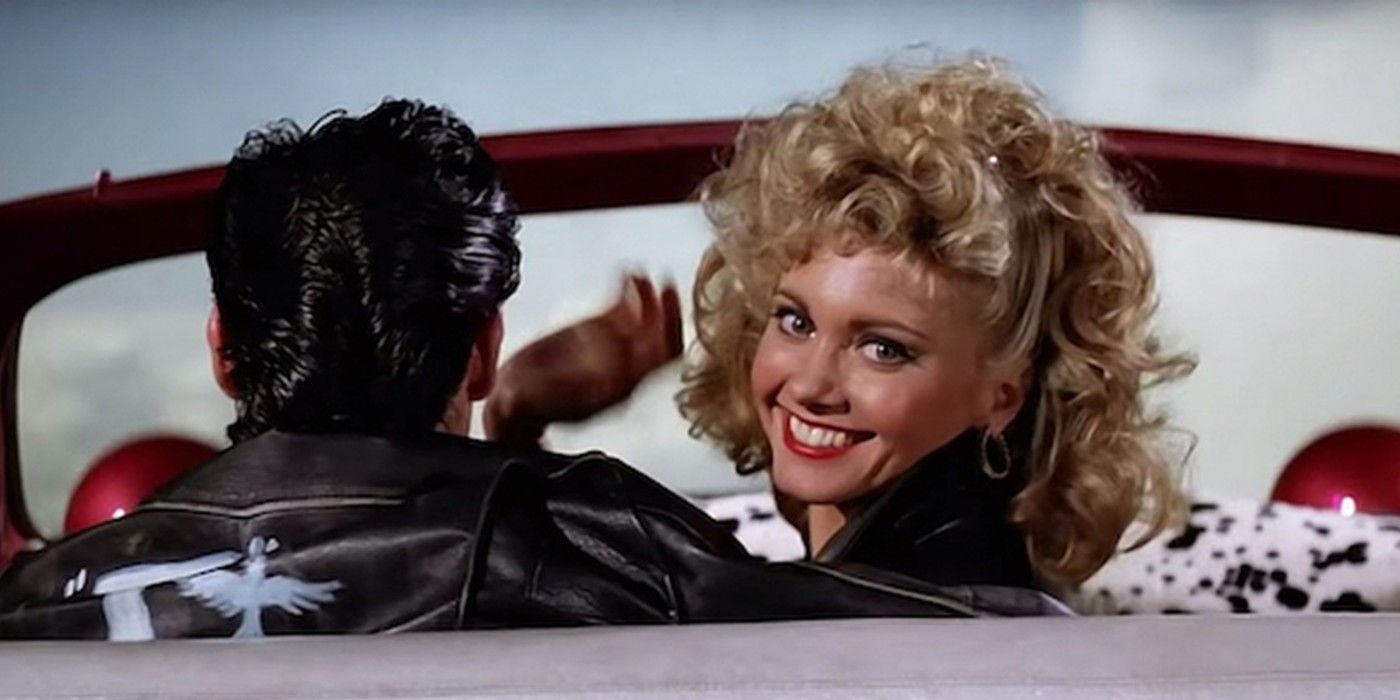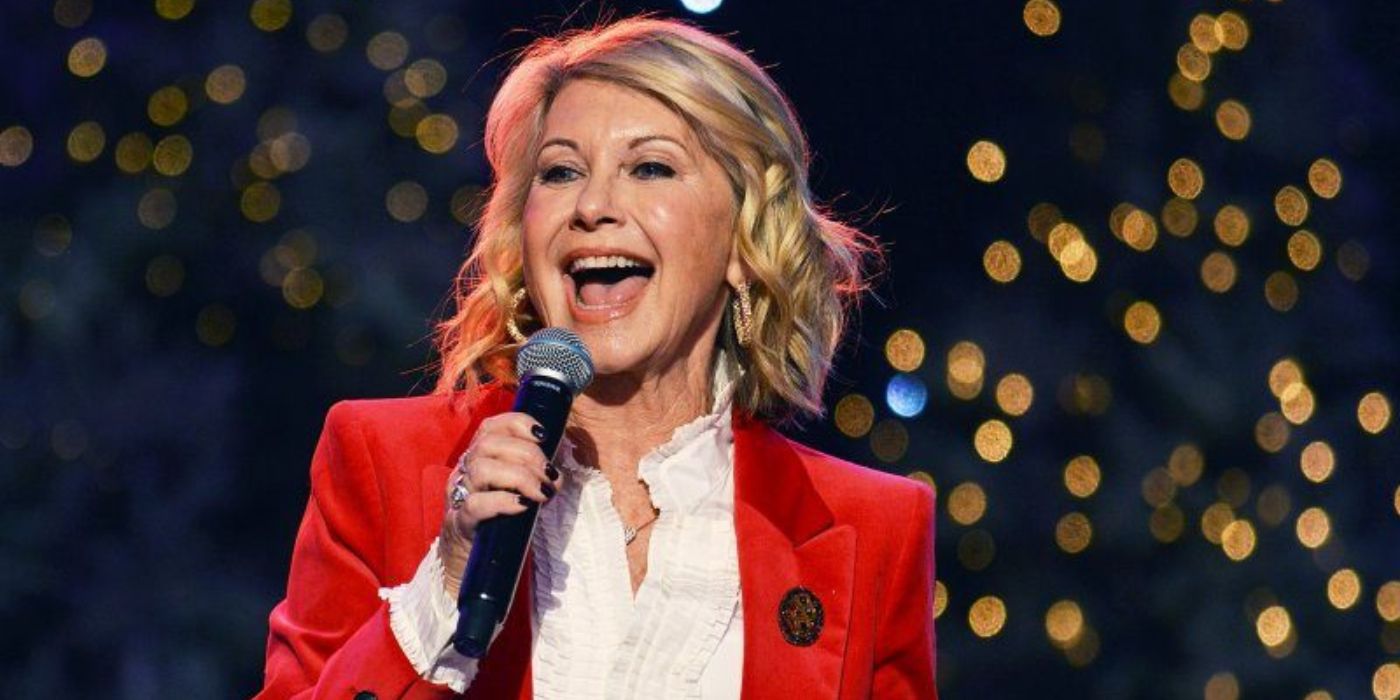The flying car in Grease that pops up near the culmination of the film has led to many theories and concepts so it helps to have the Grease ending explained. Although Grease technically takes place in the 1950s, the contemporary fantasy largely deals with 1950s teenagers grappling with 1970s themes about gender and sexuality. Grease follows the romance between Sandy Olsson (Olivia Newton-John) and Danny Zuko (played by a young John Travolta) and their group of friends as they navigate their senior year of high school and their fears about graduating and becoming adults.
One of the most famous and controversial scenes in Grease happens at the end when good-girl Sandy transforms into a greaser girl, and she and Danny perform "You're The One That I Want." Sandy's evolution from a good girl into a provocative greaser has been both praised and criticized in the years since the film's release, as has the sudden shift into magical realism when the car flies into the sunset. The ending of Grease has been debated since its release, but what do Sandy's transformation and the flying car really mean? The ending of Grease, explained, offers plenty of clues.
Why Sandy Changes At The End Of Grease (Is It Just For Danny?)
Throughout Grease, Sandy, played by Olivia Newton-John, repeatedly struggles with her identity as her friendship with the Pink Ladies opens her up to new ideas about femininity. While Sandy's transformation has been criticized for forcing her to change her personality for Danny, it's the logical end for her character arc of self-discovery, confidence, and her eventual rebirth. On the surface level, Sandy's change might be for Danny. Instead, it continues her journey of questioning her identity, which began with the song "Look At Me, I'm Sandra Dee" and concluded with the reprise, when she sings, "goodbye to Sandra Dee."
Sandy's exposure to Danny and the Pink Ladies (whose girl gang has their own Grease prequel series) forces her to grapple with her realization that the good-girl exterior is masking the more authentic woman inside. Ultimately, it's Sandy's decision in "You're The One That I Want" to break from her reputation and take what she wants. Completing Sandy's arc towards self-discovery by transforming her into a greaser girl during the Grease ending represents her rebirth and her newfound confidence in her identity.
Why The Car Flies In Grease's Ending
The most bewildering part of the Grease ending is when Sandy and Danny climb into a car that takes off and flies into the sunset. It's a weird shift into magical realism while the rest of the movie is a fairly standard teen comedy, but a closer look reveals that the flying car fits right into Grease. When the Grease ending is explained, everything comes together.
It's not the first fantasy moment, following the dream sequence "Beauty School Dropout" and the heightened realism of "Greased Lightnin'" and it was almost replicated in the originally planned ending to Grease 2. In addition, the shop teacher aiding the T-Birds sets up the twist, saying that, "if it were in any better condition, it would fly." Still, while the flying car is a departure for Grease, it serves as a symbol that Danny and Sandy are quite literally flying into the sunset for their happy ending. Strengthening that interpretation is the popular fan theory that Grease doesn't represent accurate events, but is someone's nostalgic memory of their time at Rydell, explaining the dream-like quality in the film. In that case, flying a car into the sunset as a representation of Danny and Sandy's happy ending makes perfect sense for the movie.
Rizzo's Pregnancy Scare & Ending: What It Means
The polar opposite of Sandy is Rizzo (played by Stockard Channing). Rizzo is a bold and confident woman who undergoes a pregnancy scare in Grease from her relationship with Kenickie. If Sandy represents passive female desire – which becomes active by the Grease ending – then Rizzo represents active female desire. Rizzo's pregnancy scare is a major part of her arc, combined with her inability to tell Kenickie about it because she's afraid he will leave her. Rizzo's struggle with her vulnerability and need to be liked against her confident exterior is her primary crisis in Grease and one that she is forced to work through almost entirely alone.
Although Rizzo ends up not being pregnant, the fear forces her character to grow and become more vulnerable after the experience, culminating in Stockard Channing's heartbreaking performance of Grease soundtrack highlight "There Are Worse Things I Could Do." By the end of Grease, Rizzo's relief that she isn't pregnant helps her realize the opportunities in her future, a moment that the film nods at by lingering on Rizzo when Principal McGee remarks that the next Eleanor Roosevelt could be in the room. Rizzo's pregnancy scare provides an excellent contrast to Sandy, and both represent a woman struggling with the weight of her reputation contradicting her authentic self.
What Happens Next For The Characters
Grease's ending leaves its characters cautiously optimistic about their lives following graduation and invites the audience to speculate about their futures. In Grease 2, a few of the characters reappear; Frenchy is back in Grease 2 to show Sandy's cousin around Rydell, having returned to get her diploma and start a cosmetics company. Most of Rydell's teachers also return in Grease 2, with Principal McGee and her assistant still running the morning announcements and Coach Calhoun still trying to shepherd his rebellious students. The leader of the rival gang, Leo Balmudo, appears again in Grease 2 as the primary antagonist, and it's heavily implied that he is arrested at the end of the movie.
While the futures of the Pink Ladies are never confirmed, Marty likely ended up pursuing Vince Fontaine or another marine, and Rizzo may have been involved in the women's liberation movement following her pregnancy scare. Sandy and Danny's post-Grease future is uncertain, but fans have speculated that they likely stayed together after riding off into the sunset – unless the fan theory speculating Sandy has been dead the whole time is true.
Is Sandy Dead In Grease?
A popular fan theory about Grease offers up another explanation for the ending: Sandy drowned in "Summer Lovin'." The entire movie is an elaborate fantasy sequence taking place during her coma, ending with her death at the end of the movie. The theory began with Danny's line, "I saved her life, she nearly drowned," and posits that Danny failed to save Sandy's life, with the rest of Grease essentially being wish fulfillment for Sandy.
The theory also suggests that the infamous flying car represents Sandy's ascent into heaven as opposed to a symbolic happy ending for her. This would also explain why Sandy and Danny didn't return for Grease 2. The theory gained enough popularity that John Travolta addressed it in 2016, and Grease creator Jim Jacobs finally rebuked the theory to TMZ. The announced Grease prequel movie, Summer Loving, could put this theory to rest once and for all. Still, if Sandy were dead the whole time, it would explain the strange ending of the film and the magical realism perpetuating Grease.
What Grease's Ending Really Means
Grease was a contemporary fantasy that explored 1970s themes about sexuality, gender, and the fear of growing up through the lens of teenagers in the 1950s. The movie explores Rizzo and Sandy as parallel examples of female desire, ending with Olivia Newton-John's Sandy fully realizing her self-confidence and her rebirth, contrasted with Rizzo's realization that her softness and vulnerability can be one of her strengths.
Grease ending with Sandy and Danny literally flying away in a car, while it's likely not a representation of Sandy going to heaven, does represent a happy ending for both characters. Grease is less of a realistic look at Rydell High's students and more a nostalgic one filtered through rose-colored lenses, and ending the movie with the characters flying into a sunset strengthens that theme. Although the flying car seems out of place in the otherwise quasi-realistic movie, flying into the sunset together and embracing the opportunities of the future is the perfect ending for Grease.
Is The Ending Of Grease Problematic?
In the modern day, TV and movie fans have spent a lot of time pointing out the problematic elements in classic pieces of film. Those can range from things like two female characters never having a real conversation about anything other than their love lives and racial stereotypes being equated with villainy to women only seeing themselves as having value in their relationship to the male characters around them. It’s the latter element that some fans argue could make the ending of Grease problematic. If Sandy changes everything about herself solely so other people will accept her, does she see the value in herself outside of her relationship with Danny, the T-Birds, and the Pink Ladies?
Sandy’s transformation, after all, could arguably begin when Frenchy pierces her ears at their sleepover. She’s apprehensive about doing it, telling Frenchy, “My mother won’t like it,” but Frenchy does it anyway. She hears the comments made about her by Rizzo behind her back, and wonders if Rizzo really sees her that way. If fans of the movie view Sandy’s Grease ending through a problematic lens, it should be her desire to fit in with the Pink Ladies that worries them rather than her attempt to appeal to Danny. That begins much earlier, and it’s the Pink Ladies who coach her on what to do during the big reveal of her new look.
The transformation present in teen movies and romantic comedies is most common in "the makeover movie subgenre." Mean Girls, Clueless, and She’s All That provide some of the best examples. The makeovers in each of these different movies are presented early in the narrative and the audience is able to see that the makeover is about more than just new clothes and makeup. Female characters in these movies go on their journeys of self-discovery after the makeover, but Sandy goes on hers before. For Sandy’s end of Grease, the makeover is a final step in that journey of self-discovery that she begins when first introduced to the other Pink Ladies, so it goes against the norm and makes Sandy’s transformation seem problematic.
Actor Didi Conn, who plays Frenchie in both Grease and its sequel, asserts that Sandy’s transformation isn’t about Danny. Like many of the surviving cast members, she was interviewed for the 40th anniversary of Grease in 2018 and explained the Grease ending. Conn insisted that Sandy’s end of Grease transformation isn’t about Danny, but instead, the “hot mamma inside of her… she was just bringing another quality out.” Sandy’s transformation makes it clear that Sandy can be a layered woman, just like Rizzo. She doesn’t have to continue to be the stereotypical “good girl” to be accepted as a young woman or fit into a single box.
In the same interview, Conn also revealed that the transformation wasn’t just for Sandy, but something that Olivia Newton-John was also eager to play, “chomping at the bit” to bring out the other side of Sandy. As Conn pointed out, Newton-John’s career had been much like the perception of Sandy up to that point. She had a squeaky clean image in her pop music career, and getting to play the greaser version of Sandy, however briefly, before the car flies into the sky in Grease, allowed the singer and actor to show a different side of herself.
Sandy's Journey in Grease Transformed Olivia Newton-John Into An Icon
Sandy wasn't the only one transformed by Grease, as the role cemented Olivia Newton-John's iconic status in the cinematic pantheon. Olivia Newton-John sadly passed away in August 2022, aged 73. She was incredibly active and working until the time of her death, and she was mourned the world over when the news broke. Newton-John's career was much broader than Grease, but it was playing the naive girl turned self-assured woman Sandy that kick-started her career outside Australia. In her homeland Down Under, she'd already had success as a singer and did gain moderate traction in the Pop and Country charts in the US. It was Grease, however, than made her an international household name. Olivia Newton-John may have been most well known for playing Sandy in Grease, but her career is far more impressive than her on-screen exploits or her musical success.
She was a keen activist, especially for animal rights and the environment. Her passion as a cancer research advocate is also widely documented. The list of accolades and awards she earned throughout her lifetime is beyond impressive, and her star on Hollywood Boulevard was installed in 1981. There are also dozens of musical awards in her trophy cabinet, but her charity work also gained her considerable recognition. In 1999 the Red Cross granted her a Humanitarian Award for her Breast Cancer awareness and environmentalism, and the National Trust of Australia (NSW) granted her the status of National Living Treasure of Australia in 2012. She was a Dame in the United Kingdom and was given an OBE by Queen Elizabeth of England in 1979. Olivia Newton-John was granted a state funeral by the Australian Government upon her death in recognition of her incredible career – one that arguably skyrocketed when she and John Travolta jumped in their flying car at the end of Grease.

